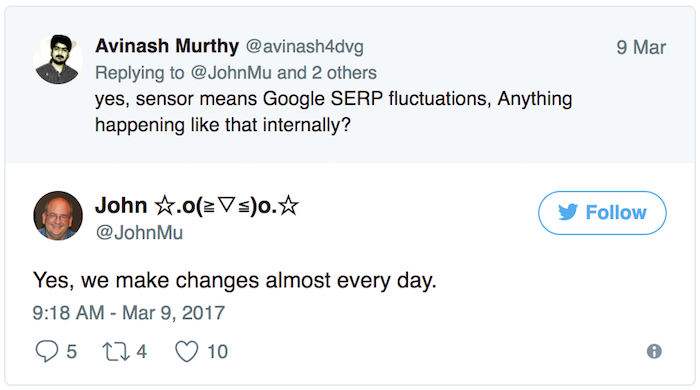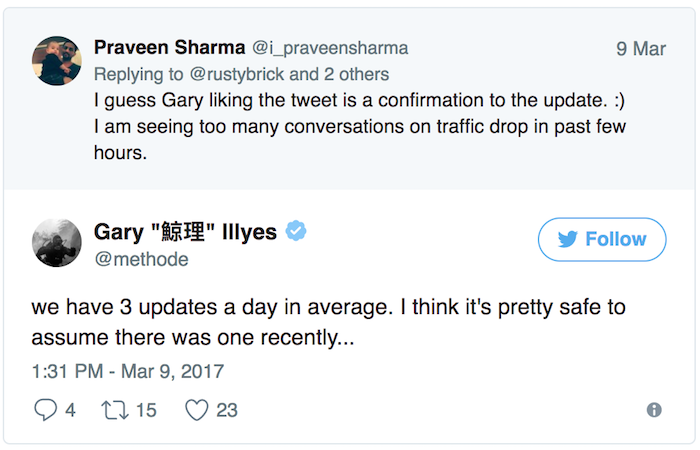Is it just us that have noticed a distinct lack of information on algorithm updates these days? In the past you could rely on yearly algorithm updates. Whilst they could still cause chaos in search results rankings and traffic changes, at least that chaos was explicable. However there now seem to be more regular changes and yet Google rarely even confirms updates.
Speculation was rife towards the end of June, with many users of Twitter and other social media proclaiming that Google had definitely made a change. Barry Schwartz – CEO of RustyBrick, a New York Web service firm – threw out the question “Are you seeing a Google algorithm update? Some are and calling it massive.”
One response was from John Mueller – Webmaster Trends Analyst at Google – who gave what Schwartz described as “his blanket Google statement on this potential Google update”: “Yep! We make updates all the time.” It’s not the first time John has called on his ‘blanket response’ to inform users about regular updates….

A fellow employee (who describes himself as House Elf and Chief of Sunshine and Happiness at Google) further compounded what everyone suspected with his retort…

Sometimes Google updates introduce brand-new ranking factors, other times they simply change the layout of the search results pages. Sometimes they seem to have significant impact, other times, they’re barely noticeable, and only cause a fraction of movement in the rankings.
So what does this mean for SEOs? Whether you work generally in digital marketing or something more specific such as an SEO agency for mortgage companies the problem is the same: without guidance from Google, what do we need to be aware of regarding algorithm changes? How can we ensure good rankings despite these ongoing changes?
We’ve been doing a bit of research on this topic – including the findings of a panel at SMX Advanced in Seattle in June. First let’s look at how you can differentiate between an algorithm update and a drop in traffic for other reasons. Then we’ll look at how you can ensure that the secrecy of algorithm updates does not result in you being penalised.

Five ways to differentiate between an algorithm update and a drop in traffic for other reasons
- If you see a drop in traffic don’t assume the worst. It may be something to do with your site rather than an algorithm update. Have there been any changes such as site redesigns or updates or analytics adjustments? Check with your technical team, your QA team, your content team and anyone else who is able to update the site to see if the reason for the changes is at your end. Also bear in mind that some sectors – such as sport, entertainment and news – fluctuate from day to day depending on what’s happening.
- As always, the better you know your data, the better placed you will be to analyse the source of changes. Your search console should indicate whether there has been any penalty – which may then indicate an algorithm change and give you evidence as to how to get round it.
- Double check where the traffic drop has been. If it turns out only to be one page then it will certainly be something to do with that page on your site rather than an algorithm change.
- Check all organic traffic data. This can fluctuate for all kinds of reasons: for example Disney removed 80,000 low-quality pages from its site and got a corresponding boost in organic traffic. If you have been affected by an algorithm update, you should only see an impact in Google. Google’s stated aim is to provide users with the best possible experience, and the updates we are seeing now are geared to do that.
- Look at your competitors and talk to your industry friends. Have others seen any changes? Algorithm updates tend to target either certain sectors or specific types of search results, so make sure you are looking at the bigger picture and find out how your overall industry is performing and being impacted.

Five tips for ensuring that the secrecy of algorithm updates does not result in you being penalised
- The overall strategy is QUALITY. Google is working increasingly to direct users to the best content online so to remain successful in search rankings you need to create and promote excellent content. Continually make your site better. If you think your site can be improved, then do it: and if you think you are doing something that might result in a penalty, take the time to stop and fix it.
- Remember that Google relies on a network of indicators to determine the trustworthiness of any given page. The strongest of these is links. So the more external links you have pointing to your site – and the more trustworthy those links are rated in themselves – the more trustworthy your site will then be judged to be. It is therefore worth spending time and effort building and managing your link profile as this will reap rewards in terms of improving your domain authority.
- However good and well-linked your site is, it needs to be seen. If Google’s web crawlers can’t see your site it will not even make it to Google’s index. So, irrespective of any algorithm updates, you need to focus on technical SEO to ensure that your site loads properly, is visible to crawlers, and also presents clear and relevant information about your brand and site. This will ensure that your site is kept visible. Remember to focus just as much on your mobile site as your desktop version.
- Also ensure that the layout and structure of your site is Google-friendly. For example your SERP entries will use page titles and descriptions extracted from your site’s metadata so you need to ensure that this is up to date and relevant. You may also want to use features such as structured markup for specific types of content such as calendars.
- Last but not least, do not be tempted to play games with Google. Google is constantly improving its ability to detect and crack down on sites that try and unfairly boost their rankings. So any tricks such as keyword stuffing, link schemes, link spamming and hidden keywords are now unlikely to achieve anything in terms of rank manipulation. The clear message is that there is no SERPs success without putting in the effort that this deserves.

Algorithm updates are now part of life, and are happening so frequently and noiselessly that they do seem like a closed book. But with the awareness of what to look out for and – more importantly – solid strategies in place to ensure success despite algorithm changes, your website should not suffer as a result.
If you want to know what the past Google algorithm updates have been (and why wouldn’t you?!) then check out this helpful timeline compiled by our partners Moz. And of course goes it goes without saying, if you want help ensuring you’re maximising your SEO and aren’t missing out as a result of any of these updates then GET IN TOUCH TODAY!

